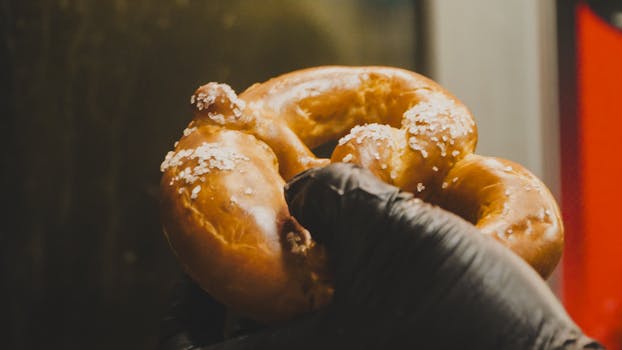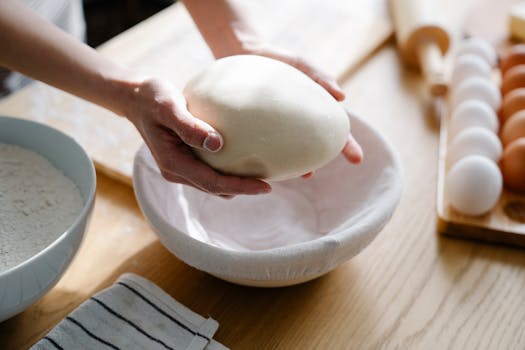You can do a college course, for example:
- hospitality and catering
- bakery
- professional bakery
Entry requirements
Entry requirements for these courses vary.
A baker is someone who prepares and bakes bread, cakes, pastries, and other baked goods. Bakers can work in large factories, small local bakeries, supermarkets, or even own their own shops. The work involves mixing ingredients, using ovens and other equipment, and decorating products. Bakers need to follow recipes carefully and pay attention to detail to make sure everything turns out just right. It is a hands-on job that can be physically demanding, as it often involves standing for long periods and lifting heavy bags of flour. Many bakers have to start work very early in the morning to make sure fresh products are ready for customers.

Bakers in the UK typically earn between £15,000 and £25,000 per year, with experienced bakers or bakery managers earning up to £30,000.
There are around 35,000 people employed as bakers and flour confectioners in the UK, according to the Office for National Statistics.
Bakers often work early mornings, with shifts starting as early as 4am, and may work weekends or holidays.

A cake decorator designs and decorates cakes for special occasions like birthdays and weddings, using icing and other edible decorations.

A pastry chef specialises in making pastries, tarts, and desserts, often working in bakeries or restaurants.

A bread maker focuses on baking different types of bread, from crusty loaves to sweet rolls, often using traditional techniques.
Find out what bakers do and what skills they need.
You can start by researching the role of a baker online or by visiting your local bakery to see how it operates. Understanding what a typical day looks like, the types of products made, and the tools used will help you decide if this career is right for you. You might also watch videos or read books about baking.
Start making simple baked goods in your kitchen.
Begin with easy recipes like bread, cupcakes, or cookies. Experiment with different ingredients and techniques. This will help you build confidence and develop a passion for baking. Ask family and friends for feedback on your creations.
Choose food technology or similar subjects for your GCSEs.
Studying food technology will give you a basic understanding of food preparation, hygiene, and nutrition. These subjects can also help you develop practical skills that are useful in a bakery setting.
Get work experience in a bakery or café.
Look for part-time jobs, Saturday jobs, or work experience placements at local bakeries, supermarkets, or cafés. This hands-on experience will help you learn how a bakery operates, improve your customer service skills, and give you a sense of real working conditions.
Join a college course or apprenticeship in baking or patisserie.
Many colleges offer courses in professional bakery, patisserie, or catering. You could also apply for an apprenticeship, where you will work and study at the same time, gaining qualifications like an NVQ or diploma while earning a wage.
Apply for entry-level baking jobs.
Look for jobs such as bakery assistant, junior baker, or trainee baker in local bakeries, supermarkets, or restaurants. Be prepared to start early in the morning, as baking often starts before sunrise. Show enthusiasm and a willingness to learn on the job.
Gain experience and consider specialising in a type of baking.
As you gain more experience, you can move up to more responsible roles like head baker, pastry chef, or even open your own bakery. You might choose to specialise in areas such as artisan bread, cakes, or patisserie. Continuous learning and practice will help you improve and succeed.
Explore relevant apprenticeships that can help you kickstart your career in Baker. Apprenticeships offer hands-on experience and training while earning a wage.
This page showcases various career options and the pathways to reach them. Each career listed here shares transferable skills and knowledge, making it easier for individuals to transition between them.
Your current career is highlighted to help you see how it fits into the broader landscape of potential career choices. By clicking on any career, you can learn more about it, including the training and education required to pursue it.
Remember, progressing in your career often involves further learning and training. This page provides insights into future career options as well as those that can lead up to your current one.
These career progression decisions are informed by comparing the skills and knowledge needed for different occupations, along with data on how people move between them. Explore the possibilities and discover the exciting journey ahead in your career!
You can get into this job through:
You can do a college course, for example:
Entry requirements for these courses vary.
You could begin your career by applying to do an apprenticeship, such as:
These can take around 2 years to complete.
You'll usually need:
You may be able to start as a trainee or assistant in a bakery shop, supermarket or food production plant, and work your way up through training on the job.
You can find out more about working in the baking industry from Tasty Careers and the Federation of Bakers.
Explore other careers or use our AI to discover personalised paths based on your interests.
Address
Developing Experts Limited
Exchange Street Buildings
35-37 Exchange Street
Norwich
NR2 1DP
UK
Phone
01603 273515
Email
[email protected]
Copyright 2026 Developing Experts, All rights reserved.
Unlock expert-designed lessons, resources, and assessments tailored for educators. No credit card required.
Claim Your Free Trial →